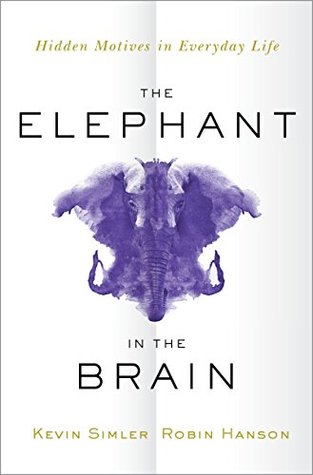More on this book
Community
Kindle Notes & Highlights
Here is the thesis we’ll be exploring in this book: We, human beings, are a species that’s not only capable of acting on hidden motives—we’re designed to do it. Our brains are built to act in our self-interest while at the same time trying hard not to appear selfish in front of other people. And in order to throw them off the trail, our brains often keep “us,” our conscious minds, in the dark. The less we know of our own ugly motives, the easier it is to hide them from others.
Humans are a peculiar species. We’re relatively hairless, we walk on our hind legs, we dance and sing like nobody’s business. We laugh, blush, and shed tears. And our babies are among the most helpless in all the animal kingdom.
Kevin’s native California is home to the world’s tallest tree species: Sequoia sempervirens, or the coastal redwood. The tallest living specimen towers a lofty 379 feet (115 meters) above the forest floor. Historically some may have been even taller, with evidence of redwoods reaching 400 feet (122 meters) and beyond. This is approximately the height at which capillary action ceases to work; any taller and a tree can’t get water from its roots to its topmost leaves. So redwoods are, in a sense, as tall as arboreally possible.
This is what’s known in the literature as the social brain hypothesis, or sometimes the Machiavellian intelligence hypothesis.3 It’s the idea that our ancestors got smart primarily in order to compete against each other in a variety of social and political scenarios.
There are good reasons to believe, for example, that our capacities for visual art, music, storytelling, and humor function in large part as elaborate mating displays, not unlike the peacock’s tail.
But it would be a huge mistake to think that politics is all arm-twisting and backstabbing. It’s also full of handshaking, backscratching, and even hugging.
These three games—sex, politics, and social status—aren’t perfectly distinct, of course. They overlap and share intermediate goals. Sometimes the prizes of one game become instruments in another. To succeed in the mating game, for example, it often pays to have high status and political clout—while an attractive mate can, in turn, raise one’s social status.
“Judge freely, and accept that you too will be judged.”
Signals are said to be honest when they reliably correspond to an underlying trait or fact about the sender. Otherwise they are dishonest or deceptive.
The temptation to deceive is ubiquitous. Deception allows an agent to reap benefits without incurring costs. (See Chapter 5 for more on deception.) That’s why the best signals—the most honest ones—are expensive.
Sometimes it’s even necessary to do something risky or wasteful in order to prove that you have a desirable trait. This is known as the handicap principle.28
But the threat of some kind of punishment must always be present, or a “norm” is little more than hot air. “Covenants,” says Thomas Hobbes, “without the sword, are but words.”
Collective enforcement, then, is the essence of norms. This is what enables the egalitarian political order so characteristic of the forager lifestyle.
When a hotel invites its guests to “consider the environment” before leaving their used towels out to be washed, its primary concern isn’t the environment but its bottom line. But to impose on guests merely to save money violates norms of hospitality—hence the pretext.16
brain; ignoring or distorting it isn’t
As Mark Twain may have said elsewhere, “If you tell the truth, you don’t have to remember anything.”
High-status individuals are also willing to call more attention to themselves. When you’re feeling meek, you generally want to be a wallflower. But when you’re feeling confident, you want the whole world to notice. In the animal kingdom, this “Look at me!” strategy is known as aposematism.44 It’s a quintessentially honest signal. Those who call attention to themselves are more likely to get attacked—unless they’re strong enough to defend themselves. If you’re the biggest male lion on the savanna, go ahead, roar your heart out. The same principle explains why poisonous animals, like coral reef
...more
real danger of laughter, then, is the fact that we don’t all share the same norms to the same degree. What’s sacred to one person can be an object of mere play to another. And so when we laugh at norm violations, it often serves to weaken the norms that others may wish to uphold. This helps explain why people charged with maintaining the highest standards of propriety—schoolmarms, religious leaders, the guardians in Plato’s Republic, the Chinese officials who banned puns in 201443—have an interest in tamping down on laughter and humor. When two people laugh at the same joke for the same
...more
Caplan, for example, estimates that signaling is responsible for up to 80 percent of the total value of education.
They’re just chasing their highs, same as the rest of us.
Incentives are like the wind: we can choose to row or tack against it, but it’s better if we can arrange to have the wind at our backs (see Box 18.).


